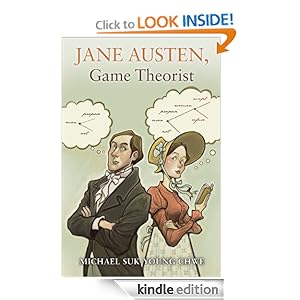None of it missed.
Recently, I noted that literary Darwinism (reducing all literature to Darwinism) seems to have been languishing since the death of its chief publicist, if not founder, Denis Dutton. Dutton also founded Web aggregator Arts and Letters Daily. At one time, practically any nonsense wittered in Darwin’s name could get itself aggregated there. Now stuff denouncing the nonsense is common.
The New Republic is, by contrast, getting pretty good at junk removal. This latest is one of the best. In “No, Jane Austen Was Not a Game Theorist,”contributing editor William Deresiewicz takes on a claim that Jane Austen and other literary greats can be understood in terms of reductive theories in science, in this case game theory. Reviewing Michael Suk-Young Chwe’s Jane Austen, Game Theorist, he writes about Jonah Lehrer as well,
Lehrer belongs to the “we used to think … now we know” school of science writing. He understands that scientific discoveries are always provisional, but he keeps pushing the recognition away. He also knows that art and science do not belong to the same order of knowledge, but he cannot sustain the idea. Although his writing is more stylish than Chwe’s, his command of his material is not much more sophisticated. Before the middle of the nineteenth century, Lehrer believes, the arts were merely “pretty or entertaining.” (You know—Goya, Beethoven, Swift.) Then came modernism, inspired by the science of its time (a claim he never supports and, in seeking to align his subjects with the science of our time, frequently contradicts). Lehrer is the kind of person who believes that people woke up on January 1, 1500 and started speaking Modern English. “Cézanne invented modernist art.” Stravinsky “steeped himself in angst.” As for Gertrude Stein, “after a few years, her revolution petered out, and writers went back to old-fashioned storytelling.” “All of these artists,” Lehrer tells us, “shared an abiding interest in human experience.” Really, all of these artists? “In a move of stunning arrogance and ambition, they tried to invent fictions that told the truth.” Too bad Dante never thought of that. Lehrer, innocent of subtlety or history or depth, with no idea of how much he doesn’t know, is like the college student who comes home for winter break, all eager to regurgitate the things he has learned in Freshman Humanities.
Like Chwe’s, his argument advances through hyperbole, self-contradiction, oversimplification, and sheer incoherence. Maybe those are no more than the failures of these two men in particular, but I think they point to something larger. I have read other efforts to analyze artistic phenomena in scientific terms—most notably, in the emerging field of literary Darwinism, itself an outgrowth of the highly dubious discipline of evolutionary psychology—and they tend to falter in the same sorts of ways. At best, they tell us things we already know—and know immensely better—through humanistic means. They are almost always either crushingly banal or desperately wrongheaded. Pride and Prejudice is about mate selection. Hamlet struggles to choose between personal and genetic self-interest: killing Claudius and usurping his throne (but the latter never crosses his mind) or letting Gertrude furnish him with siblings (though since Hamlet is already thirty, that isn’t all too probable). Interpretive questions are not responsive to scientific methods. It isn’t even like using a chainsaw instead of a scalpel; it’s like using a chainsaw instead of a stethoscope. The instrument is not too crude; it is the wrong kind altogether.
The problem of “the two cultures” is not, in fact, a problem at all. There’s a reason that art and science are distinct. They don’t just work in different ways; they work on different things. More.
Deresiewicz’s own Excellent Sheep: The Miseducation of the American Elite and the Way to a Meaningful Life will be published this summer by Free Press.
Follow UD News at Twitter!
